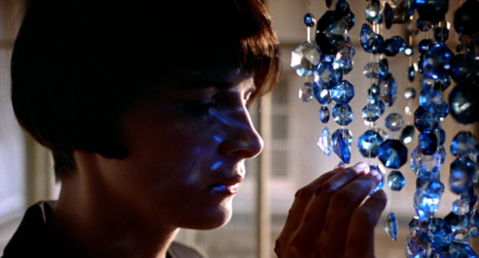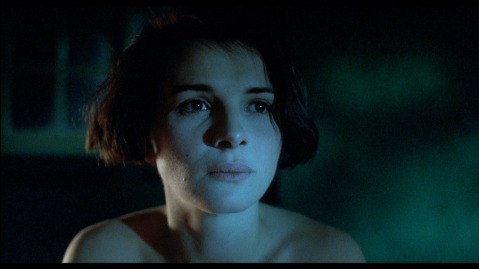Discovering filmmaker Krzysztof Kieslowski: ‘Blue’
![]()
(1993 – Director: Krzysztof Kieslowski Cast: Juliette Binoche, Zbigniew Zamachowski)
Blue paralyzes you with its insistence on showing, not telling, action. It’ a great example of how action based screenplays force audiences to find their own way to connect with characters.
The themes, emotions, and choices a character makes aren’t implicit. Julie’s history is never really explained. In fact, it feels like she hardly speaks a word in the film. But we never feel disconnected from Julie. Quite the opposite. She moves from situation to situation where her action (or lack of action) sheds light on her personality and her anguish. To emphasize more internal moments, Krzysztof boldly uses metaphors galore and a series of abrupt usage of Julie’s husband’s unfinished music. These cinematic cues clue us into the depths of Julie’s mourning and her steady transformation.
The movie is simply beautiful. The lush cinematography. The concentrated sound design. Julliette Binoche gives a powerful performance of unspoken complexity. The story plays on the fact that we immediately sympathize with Julie. Right away both her husband and young daughter are killed in a car accident leaving her severely injured. Her outrage, and dismissiveness are natural. But Julie goes further. She step-by-step rids herself of her former life. She attempts to create a new identity in a new community with new people. Even her own mother can’t recognize her.
Julie’s relationship with Olivier is at first spiteful, emotionless. But his dedication to her allows a sort of forgiveness pattern. The boy who was the first to arrive at the car accident reminds her of a funny story her husband was telling right before the crash. It’s the only time we actually see her laugh. Once Julie discovers that her husband was cheating on her, she finds a way to rise above any harsh feelings. She seeks out the mistress and simply wants to know if he loved her. Maybe knowing that her husband was still capable of love was more comforting than anything else. Maybe knowing that the mistress was pregnant with her husband’s child somehow eased the pain of losing her own child. Suddenly there was still hope in the world. This series of events releases Julie of her identity prison. She gives the mistress her old house so that she could have a place to raise her husband’s child. She, in turn, allows Olivier to finish her husband’s music piece, freeing her of the responsibility of living in her husband’s shadow. Olivier finishing the music was also the most natural way for him to show Julie that he had an identity of his own. That she needed to see him and not think of her husband.
Blue was my first encounter with the work of Polish filmmaker Krzysztof Kieslowski and the first of the Three Colors Trilogy. With each film in the trilogy representing their respective color of the French flag, Blue, represents liberty beautifully as Julie is liberated from her darkness and finds a way to move on. It was a real joy to watch Kieslowski’s style and I look forward to the rest of the trilogy.



Trackbacks / Pingbacks